T&T Clark Studies in Early Christianity (13 vols.)
Digital Logos Edition
Overview
The T&T Clark Studies in Early Christianity collection contains up-to-date scholarship on the foundations and development of Christianity during the first several centuries. Experts in the field contribute to discussion of ancient texts, early Christian theology, philosophies of other ancient religions, and the interpretation and functions of Scripture, as well as the church’s structure and spread throughout Europe and the world. As the church grew, groups of believers and significant Church Fathers developed and refined beliefs, rituals, and identities. These works offer analyses and modern perspectives on the people and ideas that caused early Christianity’s rapid development and far reach.
With Logos Bible Software, Scripture references link directly to the Bibles in your library—both the original-language texts and English translations. Clicking any word opens your lexicons to the relevant entry to save you time and add depth to your Scripture study. With Logos, you can quickly move from the table of contents to your desired section and search entire volumes or collections by topic, title, or Scripture reference.
This title is included in the following collections
You can save when you purchase this product as part of a collection.
2025 Messianic Jewish Diamond
$2,999.99$2,249.992025 Orthodox Diamond
$2,999.99$2,249.992025 Messianic Jewish Portfoli...
$4,749.99$3,562.492025 Orthodox Portfolio
$4,749.99$3,562.49
- $23,999.99$17,999.99

Key Features
- Modern interpretations of the writings of Church Fathers
- Detailed descriptions of the cultural context in which the church developed
- Insights into early Christian theology and identity
Product Details
- Title: T&T Clark Studies in Early Christianity
- Publisher: T&T Clark
- Volumes: 13
- Pages: 2,976
Individual Titles
- Ancient Jewish and Christian Texts as Crisis Management Literature: Thematic Studies from the Centre for Early Christian Studies edited by David C. Sim and Pauline Allen
- Attitudes to Gentiles in Ancient Judaism and Early Christianity edited by David C. Sim and James McLaren
- Becoming Christian: Essays on 1 Peter and the Making of Christian Identity by David G. Horrell
- Christian Philosophy in the Early Church by Anthony Meredith
- Manichaeism: An Ancient Faith Rediscovered by Nicholas J. Baker-Brian
- Philippi: How Christianity Began in Europe: The Epistle to the Philippians and the Excavations at Philippi by Eduard Verhoef
- Raised from the Dead According to Scripture: The Role of the Israel’s Scripture in the Early Christian Interpretations of Jesus’ Resurrection by Lidija Novakovic
- Reading the Church Fathers edited by Morwenna Ludlow and Scot Douglass
- Tertullian and Paul edited by Todd D. Still and David Wilhite
- The Earliest Christian Meeting Places: Almost Exclusively Houses? by Edward Adams
- The Mind of Christ: Humility and the Intellect in Early Christian Theology by Stephen T. Pardue
- ‘What Does the Scripture Say?’ Studies in the Function of Scripture in Early Judaism and Christianity, Volume 1: The Synoptic Gospels edited by Craig A. Evans and H. Daniel Zacharias
- ‘What Does the Scripture Say?’ Studies in the Function of Scripture in Early Judaism and Christianity, Volume 2: The Letters and Liturgical Traditions edited by Craig A. Evans and H. Daniel Zacharias
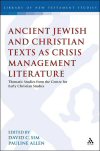
Ancient Jewish and Christian Texts as Crisis Management Literature: Thematic Studies from the Centre for Early Christian Studies
- Editors: David C. Sim and Pauline Allen
- Series: Library of New Testament Studies
- Publisher: T&T Clark
- Publication Date: 2012
- Pages: 224
This volume seeks to demonstrate that many Jewish and Christian texts in the ancient world were written as a direct response to an earlier situation of crisis that affected the author, or the intended reader. Presented here are texts from both traditions that were written over many centuries in order to establish that such crisis management literature was widespread in the religious and theological literature of ancient times. These works reveal that all manner of crises could contribute to the production of these texts—persecution, political factors, religious or theological differences, social circumstances, and internal or external threats. By understanding this crucial element in their composition, we are better able to understand the complexities of the time and to appreciate the strategies which the authors used to manage these crises.
David C. Sim is associate professor in theology at Australian Catholic University in Melbourne, Australia.
Pauline Allen is the director of the Centre for Early Christian Studies at Australian Catholic University.
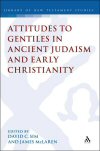
Attitudes to Gentiles in Ancient Judaism and Early Christianity
- Editors: David C. Sim and James McLaren
- Series: Library of New Testament Studies
- Publisher: T&T Clark
- Publication Date: 2014
- Pages: 256
This volume describes the attitudes towards Gentiles in both ancient Judaism and the early Christian tradition. The Jewish relationship with and views about the Gentiles played an important part in Jewish self-definition, especially in the Diaspora where Jews formed the minority among larger Gentile populations. Jewish attitudes can be found in the writings of prominent Jewish authors (Josephus and Philo), sectarian movements and texts (the Qumran community, apocalyptic literature, Jesus) and in Jewish institutions such as the Jerusalem Temple and the synagogue.
In the Christian tradition—which began as a Jewish movement but developed quickly into a predominantly Gentile tradition—the role and status of Gentile believers in Jesus was always of crucial significance. Did Gentile believers need to convert to Judaism as an essential component of their affiliation with Jesus, or had the appearance of the messiah rendered such distinctions invalid? This volume assesses the viewpoints on attitudes towards Gentiles and the status and expectations of Gentiles in the Christian church.
David C. Sim is associate professor in theology at Australian Catholic University in Melbourne, Australia.
James McLaren is senior lecturer in the school of theology at Australian Catholic University in Melbourne, Australia.
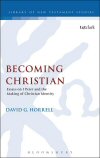
The first letter of Peter remains a relatively neglected corner of the New Testament—the number of monographs devoted to it is tiny, compared with those on the Gospels and Pauline letters. This book argues that it offers insight into crucial processes in the development of Christian identity. In particular, 1 Peter illustrates with great clarity the complex ways in which Christian identity was forged from Jewish traditions and negotiated in the generally hostile Roman Empire.
Becoming Christian is a collection of essays that discuss the first letter of Peter in its social and historical setting. In some cases, authors use social-scientific and postcolonial methods to shed light on the ways in which the letter contributes to Christian identity formation. Author David G. Horrell also examines the persecution and suffering of Christians in Asia Minor, the significance of the name “Christian,” and the response of the letter to the hostility encountered by Christians in society. These essays offer significant and original engagements with this letter and will remain a resource for studies of 1 Peter for some time to come.
David G. Horrell earned his PhD from Cambridge and is currently professor of New Testament studies at the University of Exeter. He is the author of several books, including An Introduction to the Study of Paul and Solidarity and Difference.
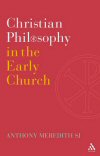
The first followers of Jesus were not drawn from the intellectual and social elite of their day, but rather from artisans, tax collectors, and the more disreputable members of society. Yet out of such seemingly insignificant beginnings, a seed was planted by his teaching, his cross, and his resurrection which was destined to spread its shade over the entire known world. What had begun as an essentially Jewish movement founded on the preaching of the Messiah became, with amazing speed, a religion that was accepted by pagans, Goths, Franks, and more. This book traces the growth of the church and the development of Christian philosophy through the first centuries.
Anthony Meredith has poured a lifetime of learning into this extraordinary book. He tells the dramatic yet subtle and complex story of the church in its relation to philosophy, always managing to avoid the two-fold danger, fatal to so many other accounts, of glib and misleading generalities on the one hand, and a dizzying, excessive display of detailed learning, on the other. Meredith is learned; but he’s always a pleasure to read. His prose is relaxed, yet clear and forceful; eloquent, even uplifting when it needs to be, and frequently graced with a wink of puckish humor. This book will surely become a standard source for students seeking to discover just what Athens did in fact have to do with Jerusalem.
—Ronald K. Tacelli, associate professor, Boston College
Anthony Meredith was for many years a member of the faculty of theology at Oxford, and tutor in patristics at Campion Hall. He also taught at Heythrop College, University of London. He is the author of The Cappadocians and Gregory of Nyssa.
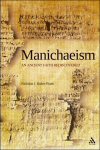
In this volume, Nicholas Baker-Brian presents an introduction to Manichaeism—the ancient religion based upon the teachings and writings of its founder Mani. Baker-Brian outlines the belief system, discusses traditions and rituals, dispels common myths, and illuminates connections between this ancient faith and European and Asian religious thinking. In the past, approaching Manichaeism proved puzzling even for scholars, but this work offers readers clear explanations and thoughtful analyses.
In short, Manichaeism: An Ancient Faith Rediscovered is quite a straightforward and accessible treatment of a topic that is too often neglected or considered as tangential to other “world” world religions. Baker-Brian’s analysis is at home in the academic study of religion, which does not take as self-evident either its object of study or the categories available to describe it.
—Studies in Religion
Nicholas J. Baker-Brian is lecturer in theology at Cardiff University. He is an expert on the religions of Late Antiquity, especially Manichaeism, and is the author of Manichaeism in the Later Roman Empire: A Study of Augustine’s Contra Adimantum.
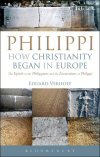
The book provides an introduction to Paul’s letter to the Philippians as well as to the history, development, and foundation of the church in Philippi. Verhoef expertly guides readers through the issues of interpretation surrounding Paul’s letter and also covers the key events of the church with careful reference to the archaeological remains present at Philippi today. What emerges is a careful guide to one of the most important canonical epistles and one of the most important cities in early Christianity. Verhoef draws attention to key artifacts, illuminating the work of Paul. This volume is indispensable for those teaching and studying the book of Philippians and early Christianity.
Mining an extraordinary amount of historical, linguistic, and archaeological research, Verhoef assesses the beginnings of the church at Philippi, then paints a portrait of changes during the next five centuries. For anybody seeking to understand Paul’s epistle of joy, penned while in prison, this is a veritable gold mine.
—The Religious Book Club
Eduard Verhoef is a retired minister, biblical scholar, and renowned expert on the community at Philippi.
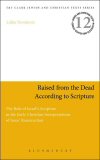
Raised from the Dead According to Scripture: The Role of the Israel’s Scripture in the Early Christian Interpretations of Jesus’ Resurrection
- Author: Lidija Novakovic
- Series: T&T Clark Jewish and Christian Text Series
- Publisher: T&T Clark
- Publication Date: 2012
- Pages: 272
This book investigates the scriptural arguments related to Jesus’ resurrection. Novakovic believes that the Davidic tradition supplied the primary scriptural categories for the claim that Jesus was raised from the dead according to Scripture. This tradition was appropriated through two major thematic trajectories: resurrection as the fulfillment of Davidic promises and resurrection as the messianic enthronement. We can also identify several related thematic trajectories, such as the concept of the resurrection as the beginning of the new creation, resurrection as the prophetic authentication, and resurrection as the messianic rebuilding of the temple. Each thematic block is based on a specific use of Scripture for the purpose of explaining the significance of Jesus’ resurrection.
Lidija Novakovic earned her PhD from Princeton Theological Seminary and is currently associate professor in the department of religion at Baylor University. She is the author of Messiah, the Healer of the Sick and a coeditor of The Dead Sea Scrolls: Hebrew, Aramaic, and Greek Texts with English Translations, volumes 3 and 6B.
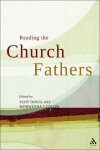
In May 2009, a group of scholars met high in the Rocky Mountains above Boulder, Colorado to present, discuss, and argue about their various ways of “reading the Fathers.” The aim was to bring together a diverse collection of scholars who, while having different methodological approaches, would be willing both to offer an example of their own practice and to engage in constructive debate of their own and others’ ways of reading early Christian texts. Rather than advocate any particular method, this book seeks to ask what exactly is meant by “a good reading.” More precisely, through constructive engagement with various answers to that question, it seeks to interrogate the assumptions which underlie contemporary readings of the early Church Fathers.
Morwenna Ludlow is lecturer in patristics at the University of Exeter.
Scot Douglass is associate professor in the Herbst Program of Humanities for Engineers at the University of Colorado in Boulder.
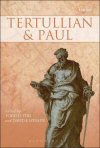
How might late-second/early-third century readings of Paul illuminate our understanding of the first-century texts? A close comparison of Tertullian and Paul reveals the former to be both a dubious and a profoundly insightful interpreter of the latter. As interest in the field of patristic exegesis grows, there is a need for examination of Tertullian’s readings of Paul. Tertullian—the first among the significant Latin writers—shaped generations of Christians by providing both a vocabulary for and an exposition of elemental Christian doctrines, wherein he relied heavily on Pauline texts and appropriated them for his own use.
This collection of essays presents a collaborative attempt to understand, critique, and appreciate one of the earliest and most influential interpreters of Paul, and thereby better understand and appreciate both the dynamic event of early patristic exegesis and the Pauline texts themselves. Each chapter takes a two-pronged approach, beginning with a patristic scholar considering the topic at hand followed by a New Testament response. This results in a fast-paced and illuminating interdisciplinary volume.
Todd D. Still is associate professor of Christian Scriptures at the George W. Truett Theological Seminary of Baylor University. Among other publications, he is the author of Conflict at Thessalonica: A Pauline Church and Its Neighbours and the editor of Jesus and Paul Reconnected: Fresh Pathways into an Old Debate.
David Wilhite is a historical theologian at George W. Truett Theological Seminary at Baylor University. He is the author of Tertullian the African: An Anthropological Reading of Tertullian’s Context and Identities.
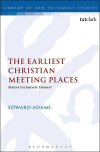
The Earliest Christian Meeting Places: Almost Exclusively Houses?
- Author: Edward Adams
- Series: Library of New Testament Studies
- Publisher: T&T Clark
- Publication Date: 2013
- Pages: 208
Edward Adams challenges a strong consensus found in New Testament and early Christian studies—that the early Christians met almost exclusively in houses. This assumption has been foundational for research on the social formation of the early churches, the origins and early development of church architecture, and early Christian worship. Recent years have witnessed increased scholarly interest in the early “house church.”
Adams reexamines the New Testament, other literary data, and archaeological and comparative evidence, showing that explicit evidence for assembling in houses is not nearly as extensive as is usually thought. He also shows that there is evidence for meeting in non-house settings. Adams makes the case that during the first two centuries, the alleged period of the house church, it is plausible to imagine the early Christians gathering in a range of venues rather than almost entirely in private homes. His thesis has wide-ranging implications.
Edward Adams is lecturer in New Testament studies at King’s College, London. He is also the author of Constructing the World: A Study in Paul’s Cosmological Language and coauthor of Christianity at Corinth: The Quest for the Pauline Church.
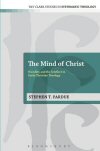
The Mind of Christ: Humility and the Intellect in Early Christian Theology
- Author: Stephen T. Pardue
- Series: T&T Clark Studies in Systematic Theology
- Publisher: T&T Clark
- Publication Date: 2013
- Pages: 224
This book brings a variety of theological resources to bear on the now-widespread effort to put humility in its proper place. In recent years, an assortment of thinkers have offered competing evaluations of humility, so that its moral status is more contentious than ever. Like all accounts of humility, the one advanced in this study has to do with the proper handling of human limits.
What early Christian resources offer—and what discussions of the issue since the eighteenth century have often overlooked—is an account of the ways in which human limits are permeable and open to modification because of the working of divine grace. This notion is especially relevant for a renewed vision of intellectual humility—the primary aim of the project—but also suggests the significance for ameliorating concerns about humility’s generally adverse effects.
Stephen Pardue’s treatment of humility is scripturally faithful, theologically profound, and spiritually nourishing. He treats this virtue in ways that honor both intellectual and ethical concerns. The book is clearly and beautifully written. Above all, it directs our focus consistently toward God’s self-giving in Jesus Christ—toward that which ultimately defines our human dignity.
—Daniel J. Treier, professor of theology, Wheaton College
Stephen Pardue is assistant professor of theology at the Asia Graduate School of Theology in Manila. He has published articles in the Scottish Journal of Theology, International Journal of Systematic Theology, and Journal of Theological Interpretation.
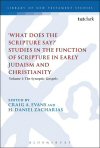
‘What Does the Scripture Say?’ Studies in the Function of Scripture in Early Judaism and Christianity, Volume 1: The Synoptic Gospels
- Editors: Craig A. Evans and H. Daniel Zacharias
- Series: Library of New Testament Studies
- Publisher: T&T Clark
- Publication Date: 2012
- Pages: 288
These essays shed light on how the founders of Christianity understood the older sacred tradition and sought new and creative ways to let it speak to their own times. Top scholars offer their perspectives:
- Gurtner discusses the Matthean version of the temptation narrative
- Chandler investigates the exhortation to “love your neighbor as yourself”
- Talbot reexamines Jesus’ offer of rest in Matthew 11:28–30
- Myers explores how Matthew’s appeal to Isaiah 42:1–4 affects the characterization of Jesus in his Gospel
- Hamilton explores 1 Enoch 6–11 as a retelling of Genesis 3–6
- Hopkins investigates the manner in which Jesus engages questions and persons regarding purity and impurity
- Miller notes that victory songs are a category of Hebrew poetry
- Gregerman argues that studies of early Christian proselytism to Gentiles are largely focused on missionary methods of converts.
Craig A. Evans is Payzant Distinguished Professor of New Testament at Acadia Divinity College in Nova Scotia, Canada.
H. Daniel Zacharias is a lecturer at Acadia Divinity College in Nova Scotia, Canada.
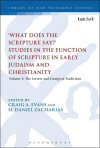
‘What Does the Scripture Say?’ Studies in the Function of Scripture in Early Judaism and Christianity, Volume 2: The Letters and Liturgical Traditions
- Editors: Craig A. Evans and H. Daniel Zacharias
- Series: Library of New Testament Studies
- Publisher: T&T Clark
- Publication Date: 2012
- Pages: 256
This volume is a collection of essays on the liturgical traditions of early Christianity. Top scholars offer their perspectives:
- Myers addresses John’s use of Moses traditions in his characterization of Jesus
- Stewart examines the Johannine use of Psalm 82 by merging a broader contextual examination with an analysis of formal logic
- Moyise discusses Paul’s quotations and explores their relevance for the scholarly consensus
- Lincicum studies Paul’s letters and the Temple Scroll and compares their exegetical practice with references to Deuteronomy
- Wells discusses the topic of divine and human agency in Pauline theology and soteriology
- Luckensmeyer investigates how Paul wove words, phrases, and themes from Obadiah into his first letter to the Thessalonian Christians
- Becker examines 2 Corinthians 3:4–18 and Mark 9:2–9
- Bucur investigates the peculiar reading of Habakkuk 3:2
- Jobes probes the extent of the influence of the 12 Minor Prophets on the writers of the New Testament
- Matlock examines Solomon’s prayer of dedication of the Jerusalem temple
- Stern proposes a new model for understanding both the role of biblical texts in early Jewish liturgy and the relationship between biblical and non-biblical utterances in the early synagogue context
Craig A. Evans is Payzant Distinguished Professor of New Testament at Acadia Divinity College in Nova Scotia, Canada.
H. Daniel Zacharias is a lecturer at Acadia Divinity College in Nova Scotia, Canada.
Reviews
1 rating

Unix
7/10/2013
Many interesting volumes, from 2009-2013. No 2014 volumes that interest me. A bit expensive at ¢8.1 a page that I would like to get to at some point, but far from the all-time most expensive ones. Note that the volumes are only ~100-300 pages long. I recognize only one of the authors, although this might be because these titles are fairly new.